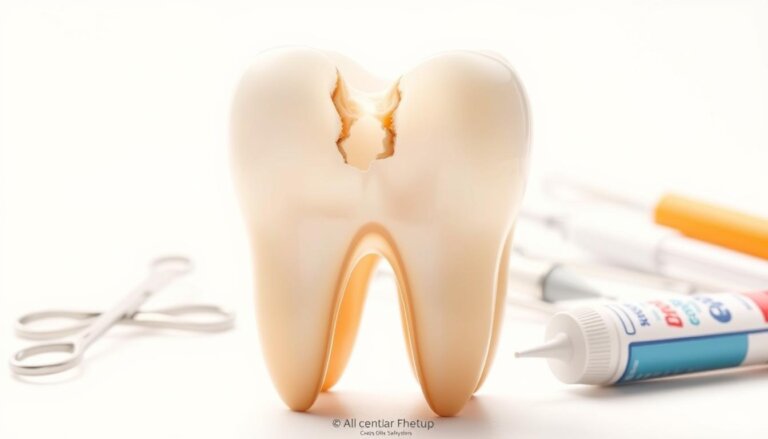Will the Dentist Scold Me for Not Flossing or for Having Cavities?
Did you know by age 34, nearly 80% of Americans will have at least one cavity? This fact might sound scary. But your next dental visit is not about fear. It’s a chance to learn and improve your oral health. Dentists want to educate and help you, not scold you.
Many of us fear being judged, which can stop us from preventing cavities and seeing the dentist regularly. Sometimes, this fear makes us skip our dental appointments. We worry about getting scolded for not taking good enough care of our teeth. But dentists are here to support us. They show us how to take better care of our teeth, instead of focusing on what we did wrong.
Understanding how dentists work with us can reduce our fear. This creates a team effort in keeping our teeth healthy. Talking openly with your dentist helps. It shines a light on how to have a healthy mouth. This way, fear doesn’t stand in the way of a bright smile.
Key Takeaways
- Majority of adults will experience cavities, which are a common focus in preventive oral care.
- Dentists prioritize patient comfort and proactive oral hygiene education, not criticism.
- Regular dental checkups are essential in cavity prevention and fostering better oral health habits.
- Dental anxiety can be mitigated through understanding the supportive role of dental professionals.
- Forming a trusting relationship with your dentist can make the experience more comfortable and effective.
Understanding Your Dentist’s Perspective on Oral Health
When you see your dentist, you might wonder how they view your dental hygiene practices. Dentists are key in promoting great oral health. They aim to treat diseases, teach about prevention, and support patients.
Dentists find flossing very important for clean teeth. Even though many people don’t like to floss, doctors know it prevents cavities and dental issues. They’d rather teach you its benefits than scold, helping you see how it helps in the long run.
What Do Dentists Really Think About Flossing?
Flossing is a must in dental care, seen as crucial by dentists. But many don’t do it right. During a dental exam and cleaning, they show the right way to floss. They stress its role in avoiding big dental procedures.
Are Cavities a Sign of Poor Oral Hygiene?
Having cavities might point to not-so-great oral care, but it’s not just about hygiene. Genes, what you eat, and how often you see the dentist also count. Dentists check all these factors, aiming to prevent or manage cavities with tailored advice.
They talk about the harm sugary foods can do and how stopping decay early is cheaper and less painful than fixing a cavity later. This helps change how patients think about dental hygiene practices and caring for their oral health.
To wrap up, dentists are your partners in keeping your mouth healthy. They focus on teaching and preventing problems with good dental habits.
Common Reasons People Fear Dentist Visits
Fear of judgment and dental anxiety are big reasons why people skip the dentist. Many worry that they will be scolded for not taking better care of their teeth. Yet, dentists want to fix problems and teach you, not judge.
Fear of pain or shame can make you anxious about dental visits. Talking openly and finding a caring dentist can help you get past these fears. This ensures you keep up with your dental health.
Fear of Judgment: Is It Justified?
Some avoid the dentist, scared they’ll be judged for their oral hygiene. But, dentists are here to help and improve your dental health, not just to judge or scold.
The Role of Dental Anxiety in Avoiding Care
Dental anxiety can make you wait too long between dental visits. This makes any dental issues worse. Finding help for your anxiety can make dental care easier and less scary.
The Importance of Flossing: A Key Component of Oral Health
Making flossing a part of your daily dental hygiene is key for cavity prevention. It’s more than just cleaning between your teeth. It ensures your whole mouth stays healthy by getting rid of food bits and plaque. This can prevent serious tooth issues.
Flossing removes particles and plaque from places brushes can’t reach, playing a crucial role in dental health. To get all its benefits, use the right technique. It should be gentle to not hurt your gums but effective enough to clean well.
How Flossing Helps Prevent Cavities
Flossing regularly breaks up plaque, which is key to stop tooth decay and cavities. Removing plaque cuts down cavity risk, keeping teeth healthy for a long time.
Flossing Techniques for Effective Oral Care
To floss best, use a new floss piece for each tooth with a gentle sawing action. Here are the best ways to floss:
- Take about 18 inches of floss, wrapping most around one middle finger and the rest around the other.
- Move the floss between your teeth in a zigzag, and curve it into a “C” shape against each tooth.
- Slide the floss gently up and down against the tooth and beneath the gumline.
Using these flossing steps can really boost your dental hygiene, improve oral health, and help with cavity prevention.
Cavities: Causes and Consequences
Cavities start when bacteria stay in your mouth too long. Eating lots of sugary snacks and not brushing well makes it worse. We will look at what causes cavities, what happens if you ignore them, and how to know if you have one.
What Leads to Cavities?
Keeping your mouth healthy means knowing what causes cavities. Bacteria turn sugar into acids, which eat away at tooth enamel. Bad habits, like not brushing, drinking too much sugar, and skipping fluoride, make cavities more likely.
The Impact of Untreated Cavities
Not dealing with cavities can harm more than just your teeth. They can cause big tooth damage, needing treatments like root canals or removal. The infection might also spread, showing why good dental care is key.
Signs You May Have Cavities
- Consistent toothache: A clear indicator of potential cavities.
- Sensitivity to hot and cold: Teeth becoming unusually sensitive to temperature could suggest enamel degradation.
- Visible holes or pits in your teeth: These are actual cavities that have formed in the enamel.
- Pain when biting down: This can mean that the decay has reached the middle of the tooth, affecting sensitive tissues.
Going to the dentist regularly is key to stop cavities early. These check-ups and a good dental care routine can prevent bigger problems caused by cavities.
| Condition | Description | Preventive Measures |
|---|---|---|
| Cavities | Erosion of tooth enamel due to acids produced by bacteria. | Regular brushing, use of fluoride toothpaste, reducing sugar intake, and routine dental check-ups. |
| Tooth Sensitivity | Discomfort or pain in teeth when exposed to certain temperatures. | Use of desensitizing toothpaste and avoiding highly acidic foods. |
| Enamel Erosion | Losing surface hardness of teeth resulting from acid attack. | Fluoride treatments and avoiding brushing immediately after consuming acidic foods. |
How Dentists Approach Flossing Discussions
Oral health talks between the dentist and patient are key. These conversations focus on improving flossing habits, important for dental care. Dentists aim to be supportive and informative, not just scold.
Dentists work to make the benefits of healthy teeth and gums clear. They give practical tips for effective daily flossing. Patients get feedback on how regular flossing prevents cavities and gum disease.
- Understanding Necessity: Dentists explain how good flossing helps maintain oral health.
- Encouragement Over Critique: They create a positive space to help patients better their flossing habits.
- Educational Guidance: Patients discover new flossing tools and techniques for an easier routine.
Such talks about flossing help patients learn and want to care for their mouths better. This way, the fear of getting scolded turns into positive action. It boosts patient confidence and care for oral health.
Cavities and Your Dentist: Addressing Misconceptions
Some people think dentists judge them when they find cavities. This is not true. Dentists actually want to help by finding why cavities happen and how to stop them. They talk with patients to ease fears of being scolded.
Dentists don’t judge; they try to find out what causes your dental problems. They teach how to take better care of your teeth to prevent issues. A good relationship with your dentist makes treatment better and visits positive.
Understanding Treatment Options for Cavities
There are many ways to treat cavities, like fillings, crowns, or other methods. Knowing about these helps you make choices for your care. Learning about new ways to prevent and treat cavities makes the dentist less scary.
| Treatment Option | Description | Preventative Value |
|---|---|---|
| Fillings | Materials like composite or amalgam are used to fill the cavity after decay is removed. | High |
| Crowns | A covering placed over the tooth to restore its shape, size, and strength. | Medium |
| Fluoride treatments | Professional treatments involving higher fluoride concentrations than over-the-counter products. | High |
| Sealants | Protective coatings applied to the chewing surfaces of back teeth. | High |
Strategies for Overcoming Dental Anxiety
Handling dental anxiety well means knowing and planning. It’s key to work closely with your dental team. This can turn a dreaded visit into something you can handle better.
Communicating with Your Dentist
Talking openly with your dentist helps lessen dental anxiety. Sharing your fears might change the treatment plan to make you more comfortable. It could be worry about pain or being embarrassed about oral hygiene. Talking helps your dentist make the visit easier, maybe by using sedation or giving you more breaks.
Finding a Dentist Who Understands
It’s important to find a dentist who gets how you feel. Look for those who know how to comfort people who are nervous. You can often tell if they’re a good fit during the first visit by seeing if they make you feel at ease.
Good communication and caring treatment are key to making dental checkups better for nervous patients.
Dealing with dental anxiety means being ready before and during your dentist visit. Try going to the clinic before your appointment or pick a time when you’re less anxious.
Here’s a quick guide to finding a good dental office:
| Criteria | Description |
|---|---|
| Experience with Anxious Patients | Look for clinics that say they help people with dental anxiety or that have happy stories from such patients. |
| Communication Style | Finding a dentist and staff that listen well and talk in a comforting way is important. |
| Comfort Measures | See if they have things like music, nice decor, or ways to make you less nervous, like sedation dentistry. |
| Pre-Visit Tours | Some places let you see the clinic first to help you feel more comfortable. |
Using these tips and choosing the right dentist can make beating dental anxiety easier. The first step is to admit it affects your oral hygiene and start doing something about it.
Preventing Cavities Through Better Habits
Adding good dental hygiene practices to your daily life is key. Not just for cavity prevention, but for keeping your oral health in top shape. Starting with simple, consistent steps can help keep your teeth safe.
Daily routines to maintain oral health include brushing twice a day with fluoride toothpaste. This makes tooth enamel stronger and fights decay. Flossing once a day gets rid of plaque and bits of food from places a toothbrush can’t, lowering the risk of cavities and gum issues.
Eating healthy foods low in sugar and acid is also crucial for fighting tooth decay. It’s important to cut down on snacks like sticky candy and sugary drinks that cause cavities.
The importance of regular dental check-ups is huge because they let dental pros keep an eye on your oral health and catch problems early. At these visits, dentists clean your teeth, getting rid of tartar that can cause issues. They also teach you the best dental hygiene practices for your needs.
Combining daily care with professional help is a strong way to prevent tooth decay and other mouth problems. These habits keep your teeth and gums healthy, teach responsibility, and improve your overall health.
The Role of Regular Cleanings in Cavity Prevention
Regular dental cleanings help keep your mouth healthy and prevent cavities. They are a key part of taking care of your teeth. During these cleanings, dental professionals remove plaque and tartar. This is important because these substances can build up even if you brush and floss well every day.
How Often Should You See the Dentist?
The American Dental Association says you should go to the dentist at least twice a year. Some people might need to go more often, depending on their dental health. Getting checkups regularly helps catch problems like cavities or gum disease early. This way, they can be treated before getting worse.
What Happens During a Cleaning?
A dental hygienist will clean your teeth thoroughly during a cleaning. They remove plaque and tartar and polish your teeth. This helps get rid of surface stains. After cleaning, a dentist will check your mouth for any problems and talk about what you might need to keep your mouth healthy. Cleanings are not just good for your smile; they also help keep your teeth healthy for a long time.
It’s very important to keep up with your dental cleanings. These visits are a chance to make sure you are brushing and flossing right. They help stop cavities by getting rid of plaque build-up. Cleanings are a way to protect against tooth decay and keep you healthy overall.
Remember, while taking care of your teeth at home is very important, you also need the help of dental professionals. They have special tools and knowledge that are essential for keeping your teeth healthy and stopping decay.
The Benefits of Flossing Regularly
Taking care of your teeth means more than just brushing. It needs a schedule that includes both brushing and flossing. While brushing cleans the teeth you can see, flossing gets in between teeth where bacteria and plaque love to grow. So, flossing is a big deal for stopping gum disease and cavities, showing healthy teeth and gums.
Flossing vs. Brushing: Why Both Matter
Brushing and flossing are both key for great oral health, but they do different important jobs. Brushing cleans the outside and tops of your teeth. Flossing, though, is the only way to clean between your teeth and under the gums well. This helps fight gum disease and cavities, keeping your mouth healthy.
How to Make Flossing a Daily Habit
To make flossing an everyday thing, try linking it with brushing. Keep your floss next to your toothbrush to remind you. Doing this can help turn flossing into a regular habit. Flossing not only keeps your mouth healthy but also boosts your overall health and confidence with a cleaner mouth.
- Choose a regular time each day dedicated to flossing—either morning or evening—to build a routine.
- Use a gentle hand and appropriate length of floss to avoid damaging the gums.
- Reward consistency by recognizing milestones in maintaining your flossing habits.
Good flossing habits aren’t just for looks but are key in complete dental care. They help a lot in keeping your mouth healthy for a long time. Plus, they improve your overall quality of life.
What to Do if You’re Afraid of Dental Scolding
Being afraid of getting scolded by the dentist can make many people anxious. It might stop them from going to the dentist when they need to. Knowing how to get ready for a dentist appointment can help ease this fear. It can also lead to better dental health.
Preparing for Your Appointment
Writing down any questions or worries you have can lessen anxiety. This step helps you organize your thoughts and talk better with your dentist. Sharing your concerns early on means they get addressed quickly.
Tips for a Positive Dentist Visit
Getting to the dental office early can help you feel less nervous. You might also want to bring someone you trust. Talking openly with your dentist about your fears is important. They can change how they do things to make you more comfortable.
Talking about how to manage pain and having a way to signal if you need a break are good ideas. This gives you more control and can make the visit easier.
| Strategy | Description | Benefits |
|---|---|---|
| Write Down Concerns | List your dental concerns and questions to discuss with your dentist. | Ensures that all your concerns are addressed and helps in managing anxiety. |
| Arrive Early | Get comfortable with the environment before the actual appointment. | Reduces stress by familiarizing with the setting ahead of the dental procedure. |
| Bring Support | Having someone trusted by your side during the visit. | Provides emotional comfort and reassurance, easing anxiety. |
| Communicate openly | Tell your dentist about your anxiety and discuss pain management options. | Helps tailor the treatment to your comfort level, improving overall experience. |
| Use a Signal | Agree on a hand signal to use if you need a break during the dental process. | Gives you control during the treatment, reducing fear of the unknown. |
Reassurance: The Dentist’s Goal is Your Health
The idea that dentists just scold you is far from true. Every dental professional aims to improve and maintain your oral health. A big part of good dental care is creating a positive, trusting relationship with your dentist. This is crucial because it helps you talk freely about your oral health journey. That way, you get dental care that’s right for you.
Understanding and working together are key to this relationship. It’s all about preventing problems and guiding you towards better oral health habits. Let’s look at how dentists help their patients keep their mouths healthy.
Building a Relationship with Your Dentist
Having a good relationship with your dentist helps ease the fear of being judged. This connection is important. It makes you feel safe to talk about your oral health. You won’t be afraid of getting judged or scolded.
How Dentists Support Your Oral Health Journey
Dentists do more than just fix teeth. They are teachers and partners in your journey to a healthy mouth. They focus on stopping problems before they start and catching issues early. By teaching patients how to take care of their teeth, dentists make sure you know how to make the best choices for your smile.
| Benefits of Strong Dentist-Patient Relationship | Impact on Oral Health |
|---|---|
| Open Communication | Enhanced understanding and personalization of care |
| Regular Consultations | Early detection and management of oral health issues |
| Educational Support | Improved daily dental care techniques and oral hygiene |
Conclusion: Facing Your Dental Fears
Understanding and overcoming dental fear is key to great oral health. Daily habits prevent cavities and maintain good oral care. Regular flossing, brushing, and dental visits are essential in avoiding tooth decay and gum disease.
Embracing Good Habits for a Healthier Smile
For a healthier smile, add good oral care routines. Use flossing, brushing, and cavity prevention to fight dental problems. Dentists help by giving education, care, and support without judging.
Taking the First Step Towards Better Oral Care
Beating dental fear is about more than stopping cavities. It’s about improving your dental health. Start by being open and ready to learn at your dentist’s office. Working together, you and your dentist can create a care plan that reduces fear and leads to a healthier smile.





